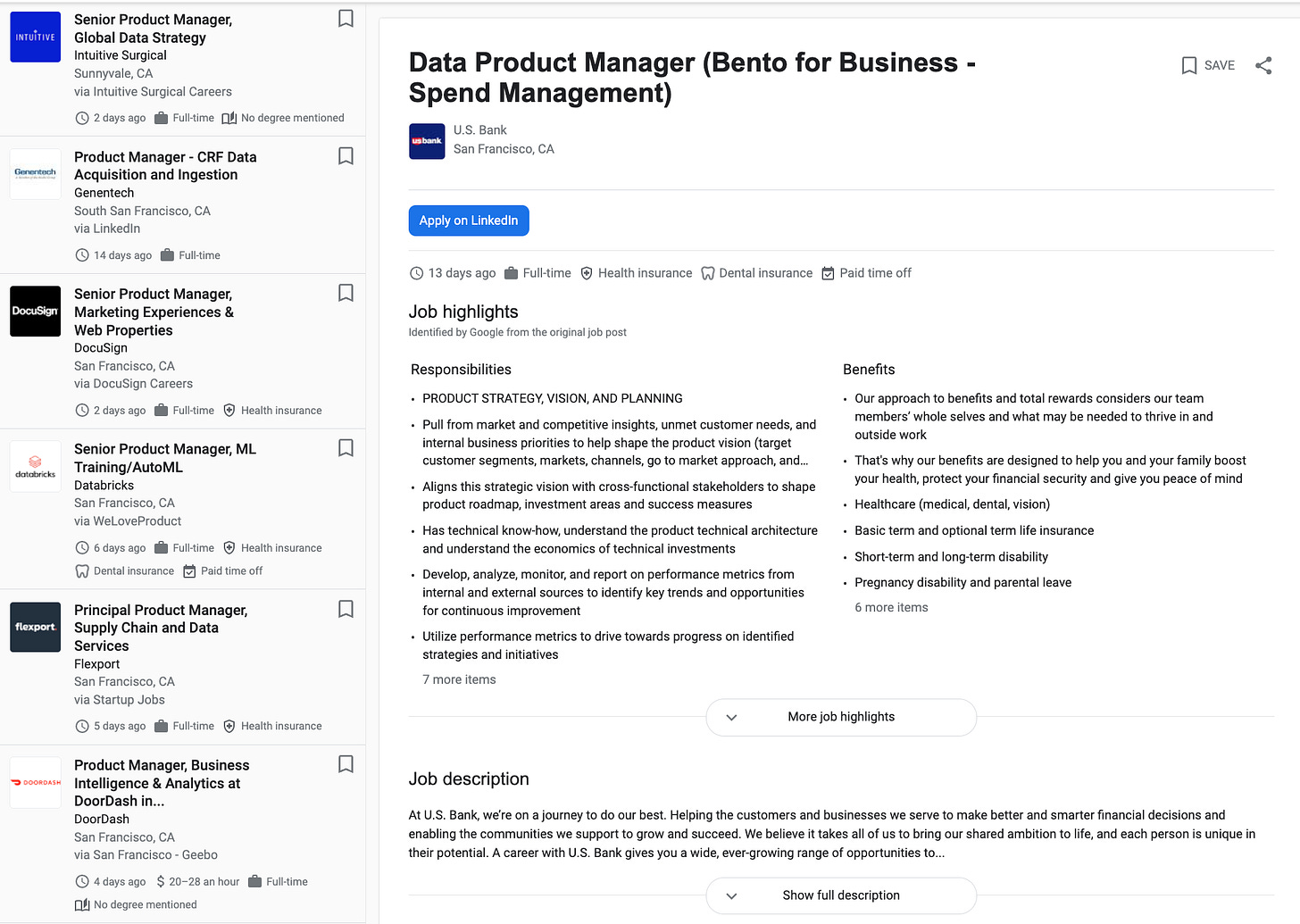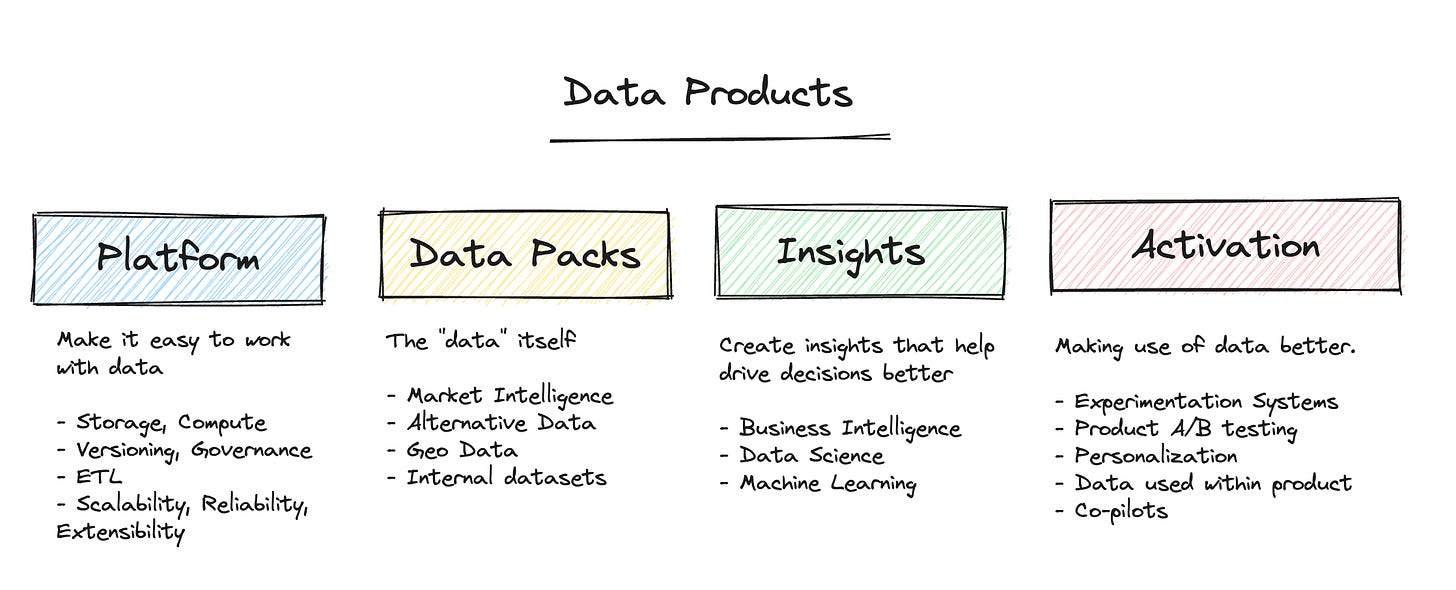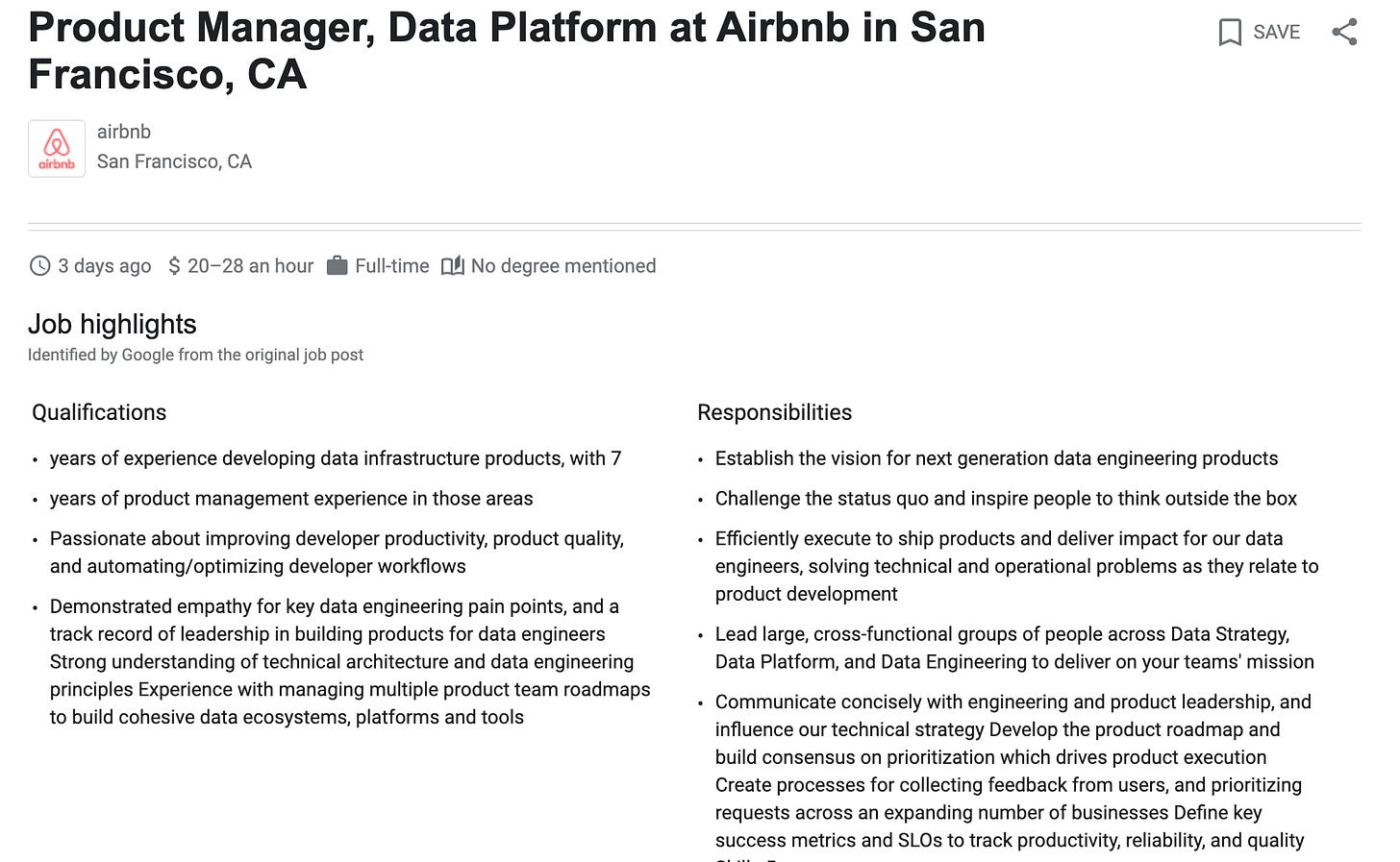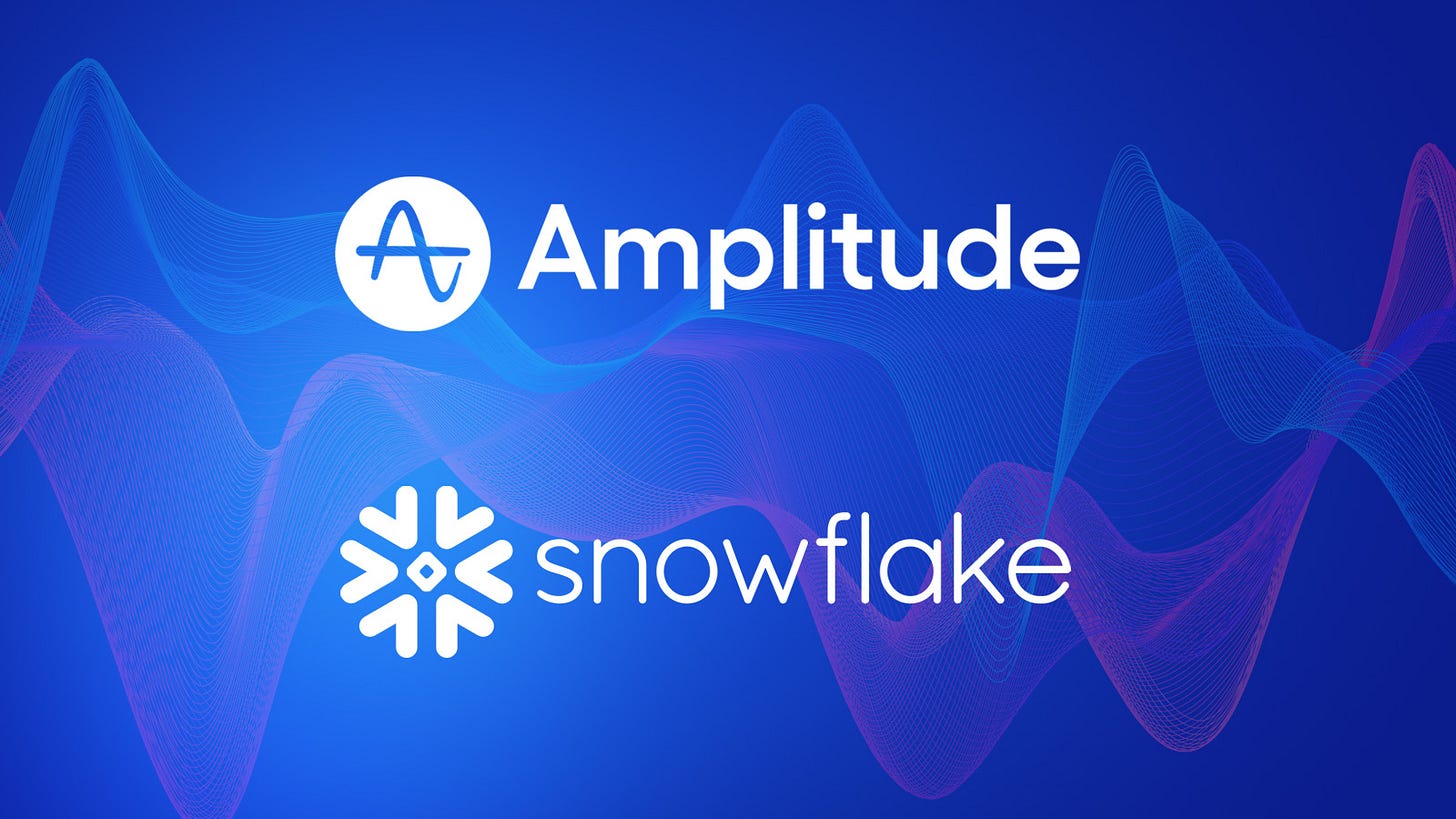Part 1: Who is a Data / ML / AI Product Manager?
Let's unpack & formalize the definition of Data Product Management and what data products are, and what skills and knowledge do you need to excel as a data PM.
Welcome Data Champions,
This is the first out of a three-part “Who is Data PM? Role, Responsibilities, and Challenges!” series:
Before we dig deeper into the data product world, let’s get started by knowing who is a Data PM and why this role is growing! If you search for “data product manager” jobs on Google, you will find many different titles:
Are all of them Data PMs? Yes. How?? It’s simple all of these roles require product managers to build some kind of data products. But, how is the PM of Business Intelligence at Doordash a “Data Product Manager” as well as the Senior PM of Marketing Experiences at DocuSign and Senior PM, AutoML at Databricks?
Who is a Data PM?
IMO, a Data PM is a person who can help drive any “Data Product”, and all the above roles require the Data PM to know data workflows, data science, and data engineering concepts. Therefore, all of the job postings above are for Data PMs!
So, now might wonder, what are Data Products? Again, there is no standard definition. However, inspired by Luke Lin’s take on it (here), and extending this further by incorporating other definitions (such as here and here), there are 4 categories of data products:
The platform focuses on building data infrastructure, data packs care about the actual data itself, insights require processing data into meaningful dashboards/reports, and finally, activation is using data to surface new product capabilities such as copilots, experimentations, and personalization! And, since each of these products can be VERY different from each other, the title varies too! There is no uniform job description for the role of a Data Product Manager. The job description varies a lot from company to company, and so does the work.
Airfocus’s blog defines a “data product manager” as someone who uses data-driven heavily to develop “data-driven insights”. On the other hand, Product HQ, a career platform for product managers, defines a data product manager as someone who helps manages a data science team and delivers on projects with the data sciences team. Finally, Barr Moses and Atul Gupte, data product practitioners define “data product manager” as someone who manages the build and delivery of an internal/external data platform (blog). There is no industry standardization of the term and its roles and responsibilities.
So, I am taking it upon myself to define it (kidding, feel free to differ!):
A data product manager is someone who either (a) helps build internal or customer-facing data tools and platform capabilities for the purpose of modeling, transforming, and exploring data, or (b) extends the functionality of an existing product using AI/ML and data analysis.
So, how does a Data PM differ from a traditional PM, you ask?
The broader role of a Product Manager doesn’t change much whether they work on a non-data product or a data product. However, the key difference as a data PM is that you need to have domain knowledge of data workflows, engineering concepts, and data science methods, as well as practical knowledge about the challenges, otherwise, it can get hard to understand what’s going on, and how to prioritize product features/use cases well.


What does this mean IRL?
More stakeholders to handle, more technical concepts and knowledge to be on top of, and being able to understand and manage the data/machine learning lifecycle, along with the software development lifecycle. Now, your decision-making needs to consider challenges regarding data sourcing, data preparation, data analysis, model scalability, model deployment, data updation, as well as model accuracy. Along with, how the model will work in production vs dev vs test environments.
Data PMs in the industry today
Now, that we understand who is a Data PM, let’s see what’s happening in the industry today. Three trends that I am currently noticing:
a. Every traditional PM will become a Data PM. There, I said it. Every software company is truly becoming a data company and is launching/building some/many data products. It could be simple as launching a smaller AI/ML capability like a new “score” or even a simple “copilot” and that requires more and more traditional PMs to understand data concepts well. For example, here’s a JD from Apple. It almost feels like AI/ML was an afterthought here.
b. More and more companies are building Data Platforms now! Making use of internal data is a competitive differentiator (19x more profitability!). Many companies are building internal data platforms to do a lot more simple run-the-business as well as advanced data analytics at scale. And, I am seeing a rising number of Data Platform, ML Product Manager roles being put out. Here’s an example from Airbnb, the simple booking app with one of the industry’s most forward data platforms:
c. PMs with technical knowledge have an advantage. Imagine how technical a PM for that role needs to be. You can’t wing it with just superficial knowledge, knowing how your data platform can augment/restrict other teams is critical for your success! I am biased here because I made a pivot from being a “feature” PM to being a “platform” PM and I could do that because I upgraded myself technically. In fact, even the company that’s hiring the first data PM is looking for people with ~5 years of experience with deep expertise in building data products, and people with technical chops will have more advantage here.
🔗 Data links of the week
The best PM link of the week was how Snowflake builds products. Jeff Hollan sits down with Lenny Rachitsky to talk about how a giant like Snowflake drives products internally.
ETL tools are dropping at the speed of light, and it’s harder to keep track of how did we land up with so many ETL tools. Chaim Turkel brings us up to speed with his amazing Medium post.
Amplitude is now available on Snowflake Container Services!! 🍿 (here) Amplitude is saying that this will help customers drive down costs, but then what’s in here for Amplitude? More customer data! Curious how the pricing model will work for Amplitude. :)
🎁 Bonus: Jobs of the week!
Some job postings if you are interested in the role now!
Data Platform @ Coinbase (link)
Build AI tools at Runway (link)
Join Clari’s Product team in India! (link) Even if you don’t have the experience, but are excited about building data products, reach out!
What’s your own take on the role of Data PM? Do you agree/disagree/sort of agree with my definition here? Will every PM be a Data PM in the future? Comment the hell out! In the next part, we will explore what are the challenges of a Data PM and how to overcome them!
Signing off!
Richa,
Chief Data Obsessor at The Data PM Gazette











I love your take on Data Products! I also agree that there is no hard or fast rule for defining data products and it's nice to have multiple mental models.
Here is one I reference often from Auren Hoffman: https://www.safegraph.com/blog/data-as-a-service-bible-everything-you-wanted-to-know-about-running-daas-companies
Hey Richa, Yes I do believe as we are moving forward Data PM will be the future. As it already started by Airbnb, traditional PM roles will be dissolved in few years and PM's have to up skill.
I am also here to learn the nuances and read more about this industry. Thanks for the info, looking forward to the next part.